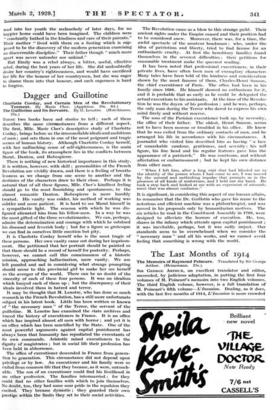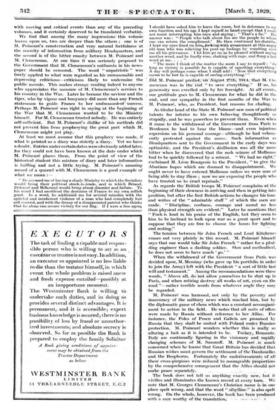The Last Months of 1914
The Memoirs of Raymond Poincare. Translated by Sir George Arthur. (Heinemann. 21s.).
SIR GEORGE ARTHUR, an excellent translator and editor, succeeded, by judicious adaptation, in putting the first foUr volumes of M. Poincare's memoirs into two English volumes. The third English volume, however, is a full translation of M. Poincare's fifth volume—L'Invasion. Dealing, as it does, with the last five months of 1914, L'Invasion is more crowded
with moving and critical events than any of the preceding volumes, and it certainly deserved to be translated verbatim.
We find that among the many impressions- this Volunie leaves upon us, two are deeper than the others ; one is of M. Poineare's consternation and very natural fretfulness at the scarcity of information from military Headquarters, and the second is of the bittei enmity between M. 'Poineare and M. Clemeneeau. At one time it was seriously proposed to the Government that M. Clemenceau's outbursts in his news- paper should be censored. The word " unpatriotic " was freely applied to what were regarded as his unreasonable and depressing criticisms—criticisms likely to undermine the public morale. This makes strange reading indeed .to 'anyone who appreciatei the measure of M. Clemeaceau's services to his country in the War. Later he became the saviour and the tiger, who -by vigour and buoyancy did more than any French statesman • to guide. France to her undreamed-of %suecess. Perhaps M. Poinelire was -right in saying at the beginning of the War that M. Clemenceau wanted to be the Ministry himself. For M. Clemenceau trusted nobody. He was entirely self-sufficietit. But M. Poincare's dislike of his methods did not prevent him from prophesying the great part which M. Clemenceau might yet play.
At least we must assume that this prophecy was niade, if what is printed• as a diary was strictly a- diary. Yet we hive a doubt. Entries under certain dates were obviously added later, for they could not have been known at the date under which M. Poincare places them. From the point of view of the historical student this mixture of diary and later information is baffling and not a little „trying. M. Poineare's amazing record of a quarrel with M. Clemenceau is a good example of what we mean :—
" He accused me of having a shady Ministry to which the Socialists would bring their political stock-in-trade, and in which Briand, Delcasse and Millerand would bring about disorder andlailure. To his mind I had sacrificed the destinies of Franceto my, own selfish good. In a word, he addre'sse'd me for several minutes With the spiteful and incoherent violence of a man who had completely lost self-control, and with the frenzy of a disappointed patriot who thinks that he alone can secure victory for our flag. If I were a free agent I should have asked him to leave the room, but in deference to my own function and his age I kept myself in haucLevept that I could not resist Otterrupting him Once and saying : " That's a lie." Ria answer was : " People who talk about lies are the people to whom one can return the compliment.' He then continued his diatribe. I kept my eyes, fixed on him,detokimpwith amagemont this angry old man who was relieving his pent-up feelings by vomiting over me all his grievances. I let him go on as he pleased without saying another word, and he finally rose, shaking with rage, and flung a last word at me. . . . "
" The more I think of the matter the more I say to myself So liong as victory is possible he is capable of upsetting everything.' A day will perhaps come- when I sha.11 add': ' Now that everything seeing- to be' lest he is Capable of Having everything.' " ' bid M. Poineare pirecliet,'Toit'Atigitst rith; 11914; that-M. Cle- menceau was in• the' end " to save everythiag." • If so, his generosity was exeelled only by his foresight.- At all events,
our gratitude goes to M. Clemenceau for what he did' in the end, and our sympathy in the first months of the War to M. Poincare, who, as President, had reasons for- chafing.
As titular head of the State M. Poincare saw men of political talents far inferior to his own behaving thoughtlessly or
stupidly, and he was powerless to prevent them. Even when it came to the withdrawal of the Government from Paris to Bordeaux he had to bear the blame—and even injurious
aspersions on his personal courage—although he had vehem- ently protested against the move.- Such information as Headquarters sent to the Government in the early days was optimistic, and the. President's - disillusion was all. the more bitter when he discovered that the rash seizure of Mulhouse
had to be quickly.followed by a retreat. " We had no right."
exclaimed M. Leon Bourgeois to the President, " to give the Alsatians hopes which are doomed to disappointment., We
ought never to have entered Mulhouse unless we were sure of being able to Stay there ; nowWe'are expoiing the peOple who
have trusted us to cruel reprisals:" • As regards the' British troops M. Pomcare complains at the beginning Of their slownesi in arriving and then in getting into position, but after the first British actions he changes his tone and writes of the " admirable stuff " of which the men are made. " Discipline; coolness, courage and moral no less than physical strength are evident." Later he mentions-that " Foch is loud in his praise of the English; but they seem to him to be inclined to look upon war as a great sport and to
suppose that they are free to choose the hours for- -fighting and resting:"
. The tension between Sir John French and Lord Kitchener comes out very plainly in this record. M. Poincare himself says that one would take Sir John French " rather for a plod- ding engineer than a dashing soldier. Slow and methodical, he does not seem to have much ' go.' " - - When the withdrawal of the Government from Paris:was decided upon, M. Messimy (who gave up his portfolio in order to join the Army) left with the President " a sort of little last will and testament." AMOng the recommendations were these words, " Aboireall, do not allow yourselves to be shut up in Paris, and when retiring destroy all works of art, even on .:the road "—rather terrible words' from whatever angle they may
be regarded. _ . .• M. :Poineare was harassed, not only by the poverty and inaccuracy of the military news which *reached Mat, but by
the diplomatic game of chess which was a constant aecompani- ment to action in the field. He notes that all sorts of offers were made by Russia without reference to her Allies. For instance, the Poles of Posen and Galicia are promised by Russia that they shall be united with Polaad under Russian protection. M. Poincare wonders whether this is really so alluring a bait as it is. intended to be. Turkey,. Rumania, Italy are continually figuring in the visionary and rapidly
changing schemes of M. Sazonoff. M. .Poincare ..is much eoncerried-Whezi he learni'lhat Great Britain has decided that Russian wishes must govern the settlement of thebardaneiles and the Boaphotas. Fortunately the "embiiirassaients of all these eross-PitrpOses were reduced. la, manageable prOpOrtiOns by the comprehensive arrangement that the Allies.should not
make peace separately. . . -
The book does not-tell us anything -exactly new,- but it vivifies and illuminates. the known record at every, turn. We note that M. Georges Clemeneeau's Christian name is-in one place spelt wrong, and that theword ",sibylline is.also-spelt wrong. On the whole, however, the book has been-produced with a care worthy Of the translation.

























































 Previous page
Previous page